Pixar's Films Ranked: From The Revolution Of 'Toy Story' Through The Adventurous 'Inside Out'
The release of Inside Out is an invitation to revisit all the films from Pixar, going back to the studio's 1995 debut Toy Story. That movie changed the landscape of feature animation with stunning immediacy; after Pixar hit the scene nothing was the same. The twenty years since have given us a total of fifteen animated films from the studio, and we can't resist the urge to do a little comparison between them. Read our own Pixar ranking, below.
(This feature contains contributions from Adam Quigley, Germain Lussier, and Ethan Anderton.)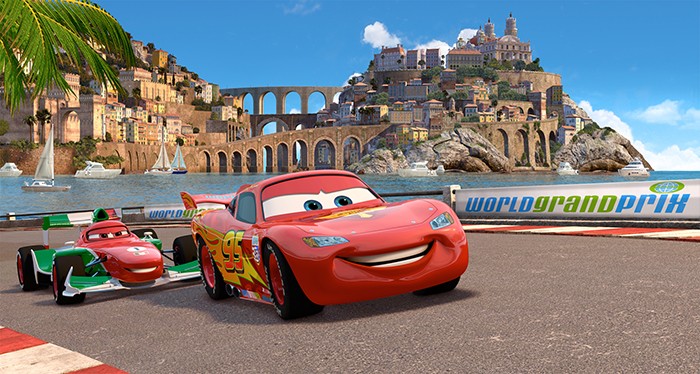 15. Cars 2
15. Cars 2
The struggle between art and commerce rages on, even with Pixar at the wheel. Cars may not have performed nearly as well theatrically as we've come to expect from Pixar, but what the film lacked in box office revenue it made up for in billions of dollars in merchandise. It seems fair to say that was a primary motivator for Pixar greenlighting a sequel to their least celebrated film, which has now in turn claimed that honor for itself. At the very least, Cars 2 should be admired for trying to take things in a decidedly different direction, centering the story around Mater (previously a supporting character) and spinning the series off into a riff on the spy genre — albeit a lamely derivative "mistaken identity" one. But hey, if the occasional Cars 2 is what's needed to help finance Pixar's more bold, original ideas, so be it.
***
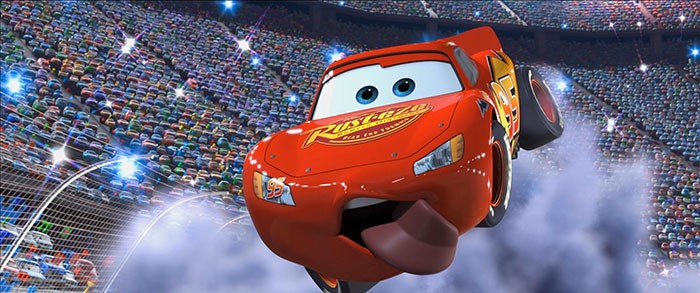 14. Cars
14. Cars
John Lasseter has been very vocal about his love of cars, so it's not surprising he would pour his automotive passions into a story that literally brings them to life. The inherent problem in that though, is that making a movie in which only sentient cars exist is stupid. Any way you look at it, the Cars universe is a logistical nightmare, save for one possibility in which it takes after Terminator (set in the distant future, when humankind has already been wiped out by the very thing it created). But no, the world of Cars is mostly a comedic afterthought (Volkswagen Beetles that are actually beetles! Hilarious!), and the characters it introduces are as blandly familiar as the story it tells with them. (*cough* Doc Hollywood!) Its message of tolerance and humility isn't as lunkheaded as what Cars 2 dealt out, but it's hardly fresh, and the lack of subtlety in Lightning McQueen's character arc only makes it less so. At least the film's racing sequences are impressive, overcoming the cartoonishly simplistic nature of the characters by surrounding them in photorealistic environments and thrillingly emphasizing the break-neck speeds at which they travel through them.
***
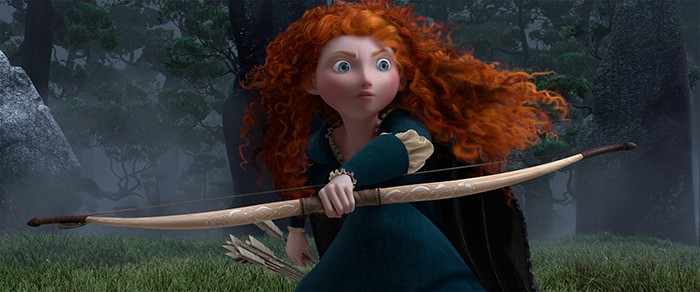 13. BraveBrave is filled with plenty of grand, dramatic moments that beautifully embody the sort of heart-dropping theatrics Pixar has grown so skilled at composing. It's the scenes between those moments that cause problems. By far the clunkiest story Pixar has told, Brave knows exactly what beats it needs to hit, because it repeatedly hits them before it's done anything to earn them. It's ostensibly an intimate tale of a mother-daughter relationship gone awry, but for once the relationship feels like a calculated obstacle, rather than an earnest, heartrending reflection of child-parent woes, a la Finding Nemo. Not enough time is dedicated to organically evolving their relationship within the action, so instead of feeling intimate, the film feels slight and forgettable. Equally problematic is the confused moral lesson at the heart of the fable, supposedly affirming how important it is to communicate and listen, but more realistically advocating a flat "listen to your parents" policy, because even if they don't know best, they will probably, hopefully, maybe come around once you've proven your blind loyalty to them. (Didn't Finding Nemo send pretty much the exact opposite message?)
13. BraveBrave is filled with plenty of grand, dramatic moments that beautifully embody the sort of heart-dropping theatrics Pixar has grown so skilled at composing. It's the scenes between those moments that cause problems. By far the clunkiest story Pixar has told, Brave knows exactly what beats it needs to hit, because it repeatedly hits them before it's done anything to earn them. It's ostensibly an intimate tale of a mother-daughter relationship gone awry, but for once the relationship feels like a calculated obstacle, rather than an earnest, heartrending reflection of child-parent woes, a la Finding Nemo. Not enough time is dedicated to organically evolving their relationship within the action, so instead of feeling intimate, the film feels slight and forgettable. Equally problematic is the confused moral lesson at the heart of the fable, supposedly affirming how important it is to communicate and listen, but more realistically advocating a flat "listen to your parents" policy, because even if they don't know best, they will probably, hopefully, maybe come around once you've proven your blind loyalty to them. (Didn't Finding Nemo send pretty much the exact opposite message?)
***
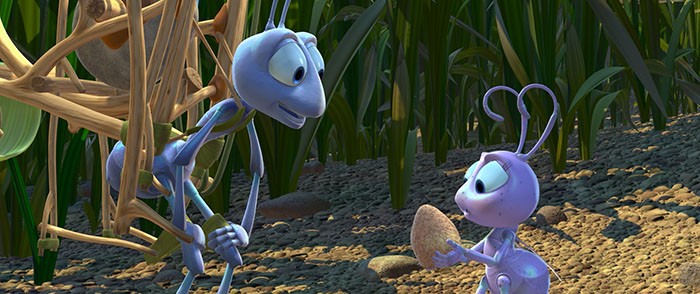 12. A Bug's Life
12. A Bug's Life
By any reasonable standard, A Bug's Life is a great kid's film. By Pixar standards, it's a solid effort, and little more. And that's just fine. The movie delivers where it counts: It's charming, lively, superbly paced entertainment, loaded with plenty of vibrant personalities (Flik, Atta and Dot notwithstanding), exciting action, and even a few valuable messages for kids to digest. Most obvious is its "believe in yourself" truism, but more noteworthy is its depiction of a society that perpetuates its own oppresion out of fear, and rejects those who dare to question it. The tyrant in charge is Hopper, possibly my favorite Pixar villain, if only because Kevin Spacey brings to him that same maniacal glee that he so menacingly brandished in Swimming with Sharks. The film also has the advantage of featuring the tiniest characters Pixar has worked with yet, which sounds like an odd thing to laud until you take into account how heavily their films play with the scale of the world around the characters in order to generate rousing set pieces.
***
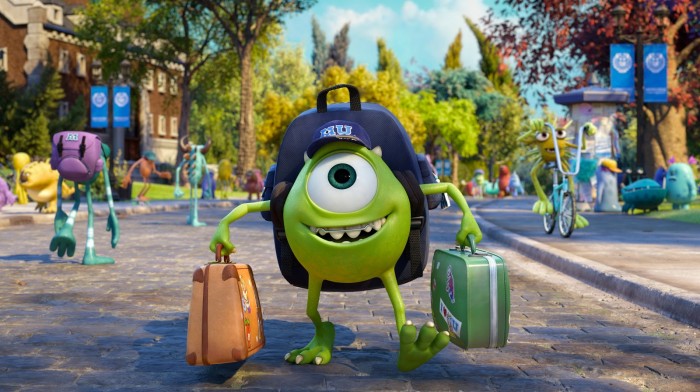 11. Monsters University
11. Monsters University
While Pixar fans were worried that Monsters University was a cash grab prequel banking on the success of the original Monsters Inc., the animation studio came through on crafting a college comedy fit for the whole family. Despite the fact that Monsters University had to retcon part of the friendship established between Mike and Sulley in Monsters Inc. (learn more about that right here), this prequel actually comes through on delivering the origin of their friendship in a pretty satisfying way. Some great new Pixar characters are introduced, including Dean Hardscrabble, a role that was originally meant for an actor, but ended up being fantastically played by Helen Mirren. And Mike and Sulley's makeshift fraternity brothers are quite the motley crew as well. Even the worst Pixar movie is better than a majority of animated films from other studios out there, and this one is still a very respectable endeavor, especially for a prequel. Making it even more respectable is a lack of shoehorned references to characters from Monsters Inc. And like any Pixar movie, it has some wonderful life lessons for kids, in this case enforcing that you can be whatever you want to be with hard work, passion and dedication, and no one can stand in your way of fulfilling your dreams.
***
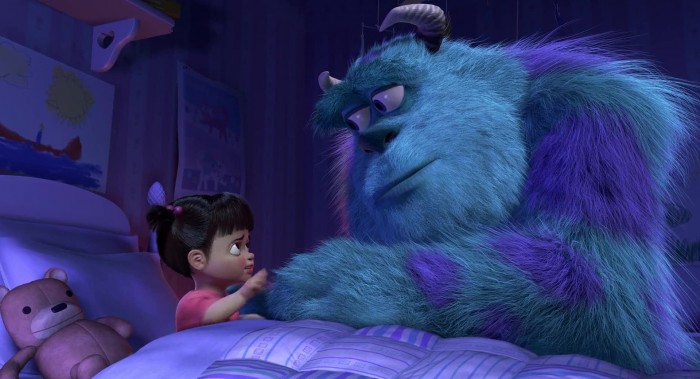 10. Monsters, Inc.Monsters, Inc. is pretty lightweight compared to some of Pixar's more emotionally harrowing fare, but what it lacks in dramatic weight it more than makes up for in charm, humor and inventiveness. The idea alone is ingenious, playing on children's tried-and-true fears of monsters in the closet by realizing an entire world dedicated to scaring children as an industrial energy source. One could argue that the film's ending has damning social implications, serving as a satirical allegory for abandoning alternative fuel sources in order to maintain a working business model, but the connection is largely superficial. Where Monsters, Inc. really impresses is its escalating comedic pacing, hilariously upending the lives of its lead duo, all at the hands of a little girl. The dynamic created by Billy Crystal and John Goodman (as Mike and Sully) is one of Pixar's most memorable, deftly balancing the rapid-fire banter and screwball hijinks with loads of warmth and heart. The real highlight of the film though, is its climax — a whirling chase through seemingly endless sliding doors, each of which is its own portal to another world.
10. Monsters, Inc.Monsters, Inc. is pretty lightweight compared to some of Pixar's more emotionally harrowing fare, but what it lacks in dramatic weight it more than makes up for in charm, humor and inventiveness. The idea alone is ingenious, playing on children's tried-and-true fears of monsters in the closet by realizing an entire world dedicated to scaring children as an industrial energy source. One could argue that the film's ending has damning social implications, serving as a satirical allegory for abandoning alternative fuel sources in order to maintain a working business model, but the connection is largely superficial. Where Monsters, Inc. really impresses is its escalating comedic pacing, hilariously upending the lives of its lead duo, all at the hands of a little girl. The dynamic created by Billy Crystal and John Goodman (as Mike and Sully) is one of Pixar's most memorable, deftly balancing the rapid-fire banter and screwball hijinks with loads of warmth and heart. The real highlight of the film though, is its climax — a whirling chase through seemingly endless sliding doors, each of which is its own portal to another world.
***
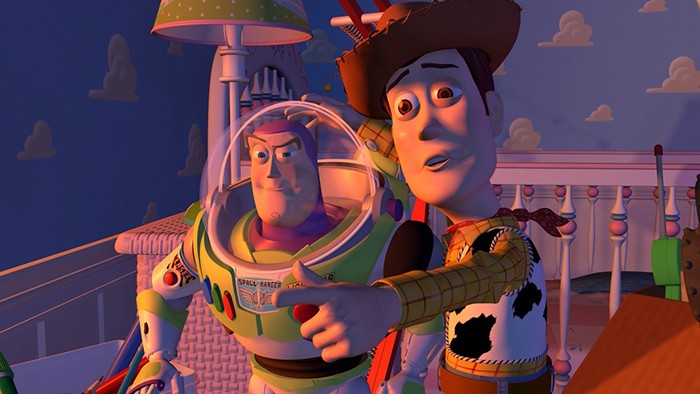 9. Toy Story
9. Toy Story
Pixar has always had a knack for conjuring up unlikely duos, but no pairing has ever come close to the comedic brilliance of their first outing with Woody and Buzz. This is when the characters were at their most well defined, enjoying a relationship plagued by irritation and hostility, and finding themselves repeatedly brought to the brink of lunacy because of it. It's all well and good that they became best buds for future installments, but only in Toy Story will you find the edginess that was originally so pronounced in their scenes together, making the resulting action that much more fun and rewarding — particularly once they find themselves trapped in Sid's house. Never before has the distance separating two next-door neighbors felt so far.
And let's not forget to give the film credit for the inspired conceit upon which this series has been built, bringing a magical realism spin to something kids already cherish and anthropomorphize: Toys. Through this fanciful notion of toys come to life, Toy Story also advances some surprisingly weighty themes, confronting what it feels like to be rejected and forgotten — or worse yet, replaced.
***
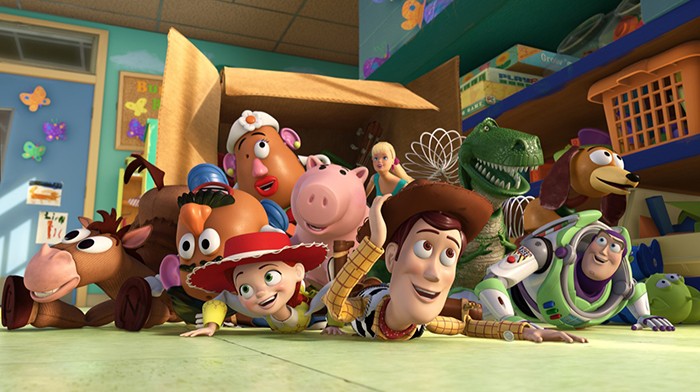 8. Toy Story 3
8. Toy Story 3
Pixar returns to the well once more, nearly besting previous outings by actively playing to their now college-aged audience with Andy himself now getting ready for college, and ridding himself of old toys. Like Toy Story 2, Toy Story 3 is hitting a lot of the same notes again, both narratively and thematically, but Pixar does such a terrific job of bringing this franchise to a close that the redundancy is easy to forgive. Beyond simply turning into a massively fun prison escape movie in its third act, Pixar sees fit to bring the themes of the series to their logical conclusion, with the characters forced to face and accept their fears of loss and abandonment in a way that's sure to leave kids reeling — and adults, too. Pixar knows how much we care about these characters, having grown up with them and come to love them more and more with time, and so they cleverly force us to confront those same fears right alongside them. But the important thing is, they had each other — and we had them. Toy Story 3 isn't just an ode to growing up and accepting change like the first film was; it's a poignant celebration of childhood imagination, embracing how much happiness we could derive from so little. And that's a beautiful thing.
***
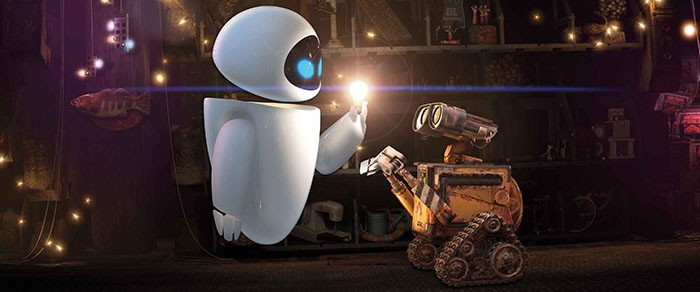 7. Wall-E
7. Wall-E
For at least half of its running time, WALL-E is pure magic. It sings with personality and good-natured humor and the bitter sting of isolation and sadness, bringing about one of cinema's most endearing love stories — attained without a single conversational exchange, unless you count characters repeatedly trying to pronounce their names. Before long though, WALL-E's enchanting, wistful yearning for companionship, and the cute visual gags he falls victim to, come to a halt, and the plot kicks into motion. Suddenly, you're stuck on a ship full of personality-deprived overweight consumerist drones and an environmental message so disconnected from its central character's plight that the film's heartfelt nature slowly drains until all you have left is poor little WALL-E, still vying for love. WALL-E's affection for Eve manages to carry the film all the way though, stumbles and all, but much of the second and third acts of the film feel like an eco-friendly diversion from the whimsy that preceded it. But man, that first half is just sensational. Up, Monsters, Inc. and Toy Story 3 may all be more consistently great, but only WALL-E has a celestial dance among the stars.
***
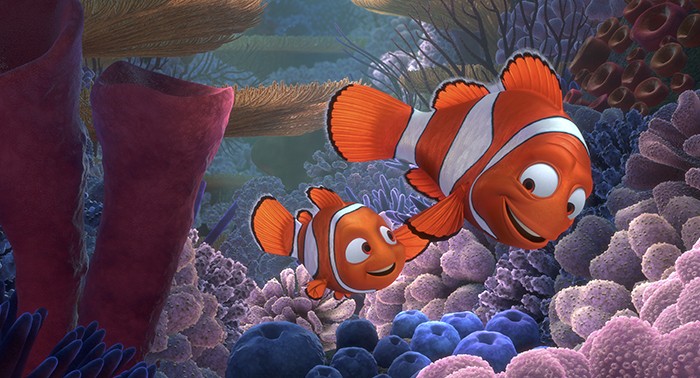 6. Finding Nemo
6. Finding Nemo
Is there a more frightening, wondrous place than the ocean? What a perfectly fitting world to set a story about an overprotective father, and what a perfectly fitting way to introduce the little ones to the vast terrors and marvels of an ecosystem completely divorced from our own. Finding Nemo has a few too many one-note joke characters, and the plot is essentially a highly episodic road movie, but its potent mixture of raw emotion and awe-fueled exploration make for an indelible combination. The film also gives overbearing parents something to think about, demonstrating how restricting your children will only push them further away, in turn exposing them to exactly the sort of dangers they were intent on keeping them from. Kids and adults alike, meanwhile, can benefit from Dory's "just keep swimming" optimism, having seen how living life in a state of constant anxiety and fear only limits yourself from happiness and interesting new experiences. That might not be the boldest message Pixar has ever endorsed, but it's championed with such sincerity — and juxtaposed with such heartbreaking tragedy — that it feels completely earned.
***
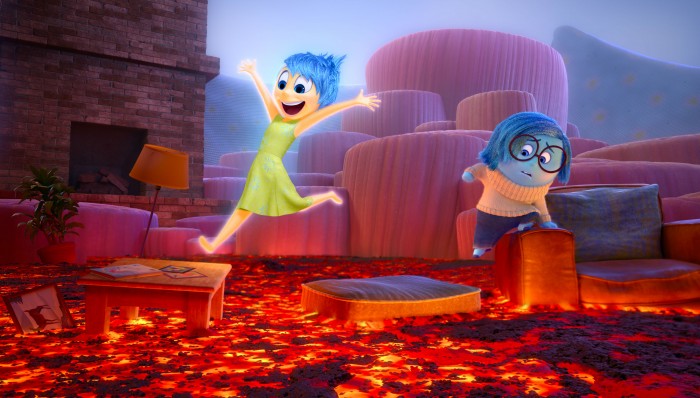 5. Inside Out
5. Inside Out
Pixar's original ideas are always innovative and exciting. The end of the world, floating houses, talking toys and cooking rats. But none of their ideas are quite as genius as the crux of Pete Docter's Inside Out. The mind of an 11-year-old girl named Riley is the setting as five emotions – Joy, Sadness, Fear, Anger and Disgust – attempt to co-exist and pilot a young girl through her life. On the surface, Inside Out works well as a kids movie. "Hey, pretty colors and characters making jokes and aww isn't that sweet." Dig a little deeper and it's a story about growing up, the loss of innocence, and the events in our lives that makes us who we are. Go deeper still, and it's a film about discovering the truths of the world, that not everything is easily defined. If it wasn't for another movie, they could have called Inside Out "Fifty Shades of Gray" because through it we learn the best things in life are exactly that. Then, all of these lessons can be viewed at any different age and, depending on your own experiences, elicit various levels of emotional satisfaction. Much like Riley's mind, the film just keeps going and going with ways it rewards you.
If anything, Inside Out ranks where it does because we haven't lived with it like we have these other films. It's the newest Pixar film and, in our minds, the least familiar. In time it could move up or maybe even down, depending on what else they have cooking in Emeryville. But few will argue that the idea, coupled with the execution, animation, music, performances and everything else come together to make a stunner of a film.
***
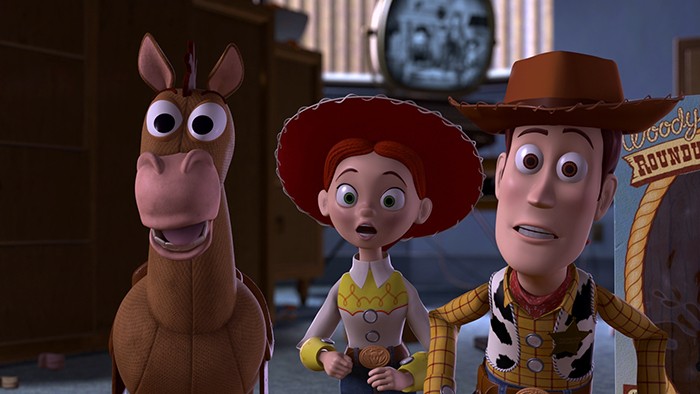 4. Toy Story 2
4. Toy Story 2
Originally starting off as a direct-to-DVD effort, Pixar managed to spin Toy Story 2 into a more than worthy successor to their classic feature debut, even if it does repeat similar themes and narrative beats. That would pose more of a problem if the film wasn't so surehanded in how it explores them, expanding on Woody's (and to some extent Buzz's) character/toy backgrounds in emotionally meaningful ways. Without "Woody's Roundup" and the drama surrounding it to anchor the film, Toy Story 2 would really just be an amusing, higher stakes adventure story, upping the ante on the house escape from the first film. With it, the film rings with a deeply felt familial longing, helping to instill the ensuing action with surprising dramatic resonance.
***
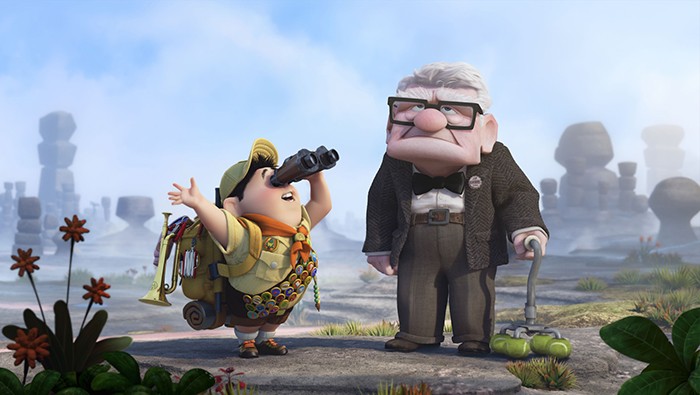 3. Up
3. Up
The spirit of adventure is alive and well in just about all of Pixar's films, but never has that spirit played so pivotal a role in a character's arc as in Up. The movie is all about revitalizing the child inside us, learning to embrace the sensational weirdness of the world around us with open arms. It's appropriate, then, that Up is by far Pixar's strangest movie, combining flying houses and exotic birds and talking dogs and the wilds of South America — not to mention one of the most upsetting montages in cinematic history. But for all of its weirdness the film still steadfastly adheres to all the expected plot machinations, never truly daring to deviate, as is true with pretty much all of Pixar's films. This isn't a negative, per se — obviously, the more you play with the rules of storytelling, the more likely you are to polarize your audience — but it does make clear the limitations of Pixar's ambition. No matter. Up dazzles all the same.
***
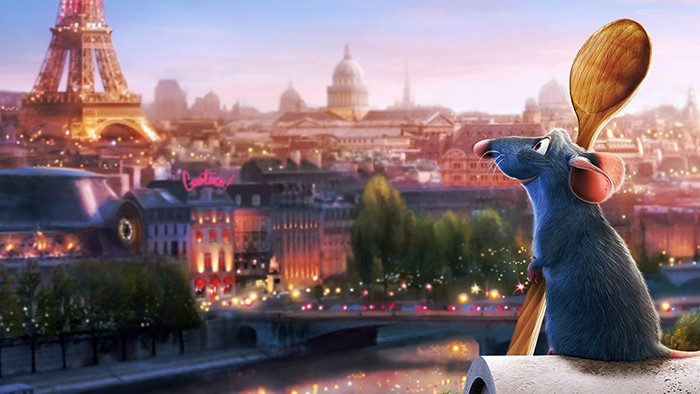 2. Ratatouille
2. Ratatouille
Not quite Pixar's least appealing concept, Ratatouille still had a lot to prove upon release. A rat that wants to cook? Oh, right, because a rat is the last thing you'd want in the kitchen. I get it. That's kind of amusing, I guess. Please don't make a movie about it. Pixar did anyway, and the culmination of that effort yielded one of their best offerings yet. I'm not sure if the film's passion for cooking stemmed from an actual passion to cook, but if not, they did a hell of a job vicariously channeling their own passions through it. At the same time, the film offsets its "anyone can cook" mantra with a little bittersweet truth from its critic antagonist, who realizes that, while not anyone can cook, "a great cook can come from anywhere."
Even though Ratatouille is dealing very specifically and earnestly with cooking, the passion that motivates its characters can apply to anything in life, and the message would ring just as true. Also in the mix is some old school physical comedy that would do Buster Keaton proud, slyly navigating that pesky issue of having to find a way to allow rats and humans to communicate without speaking. More impressive still are the exhilerating action sequences, bringing an alarming realism to the perils of scouring the world as a tiny rodent. But this is all secondary to the true heart of the story: Remy, voiced with nimble conviction by Patton Oswalt. He may be a rat, but he's as complexly human a character as has ever been concocted by Pixar, elitist and self-serving and as hugely flawed as he is smart and talented, constantly having to be reminded by his conscience (manifesting itself as the ghost of his favorite chef, like his very own Jiminy Cricket) to do the right thing.
***
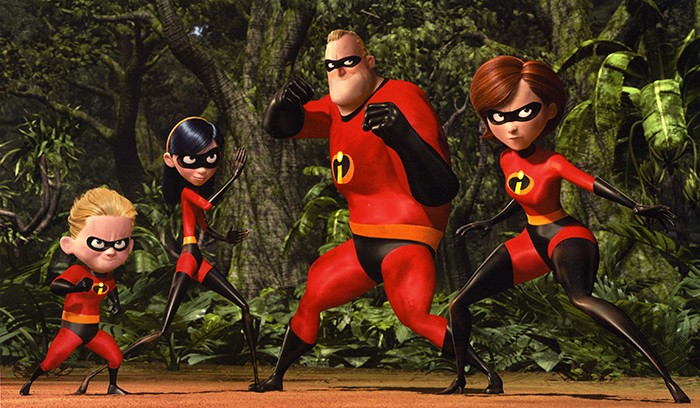 1. The Incredibles
1. The Incredibles
The Incredibles is Pixar's most human story, which wasn't a shock until recently, as for years it was their only film that doesn't cast animals or insects in main or supporting roles. It's more than that though; The Incredibles is the first Pixar film to feature a real, fully formed family, with all the dysfunction that those relationships entail. Seeing these complicated dynamics unfold within the context of a superhero story is amazing fun, and it certainly helps that the hilarious and rich mythos of The Incredibles universe (which in many ways resembles Alan Moore's Watchmen) is more fully fleshed out than those of some major comic book characters.
There's just so much to love about watching these characters in action, with the parents struggling to keep up when they've been out of the game for so long, and the kids learning to how to use their powers in combat for the first time (I still get goosebumps when Dash realizes he can run on water), and all of them adjusting to their own strengths and weaknesses to utilize their powers as a team. What's more, the film has the most challenging, even-handed themes of any Pixar film to date, arguing that (contrary to what your teacher might have told you) not everyone deserves to be hailed as special and given a gold star, while also using its hero-villain relationship to convey the darkness that can result when eager and capable young minds aren't encouraged and cultivated by those best equipped to do so.
